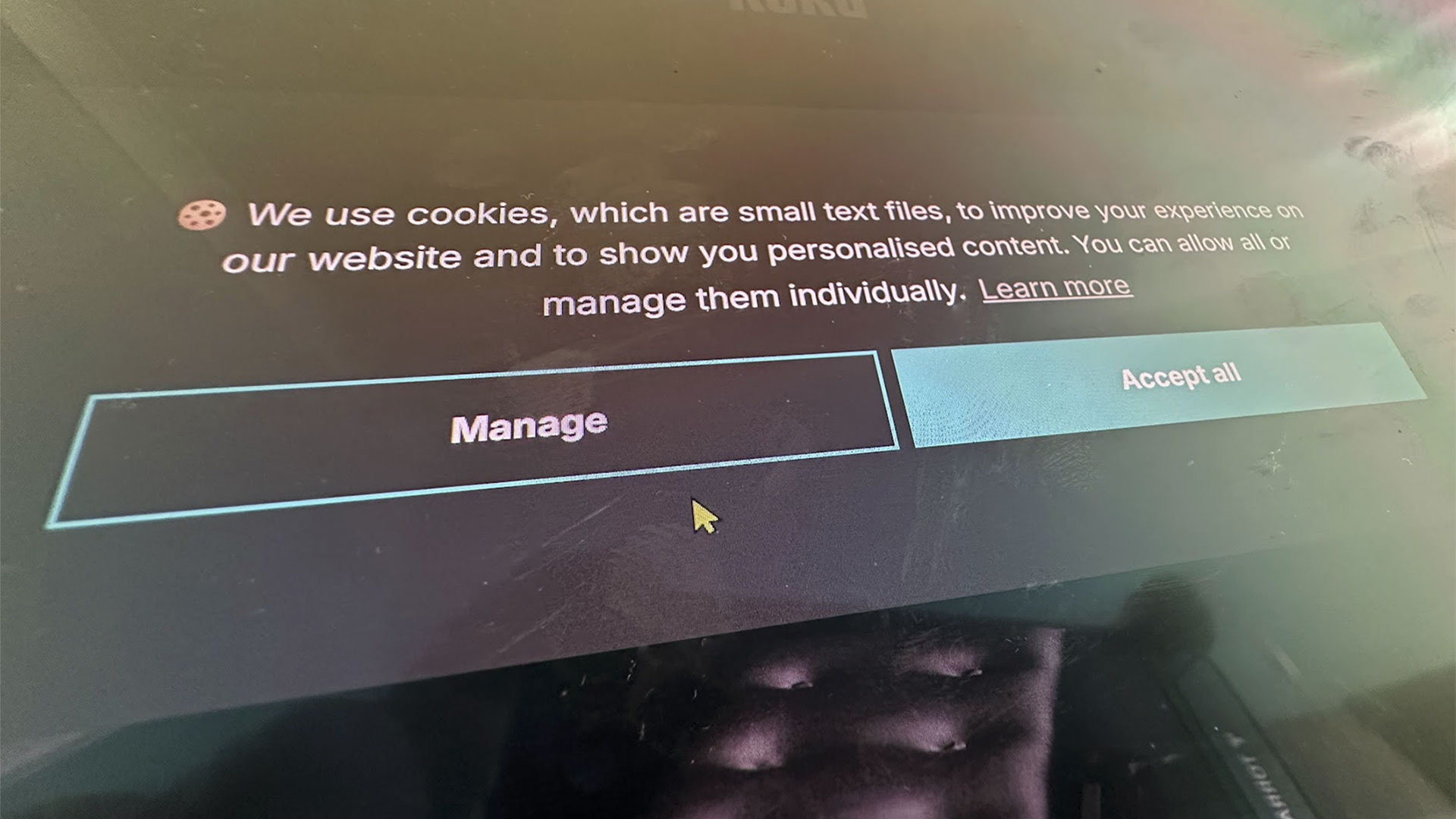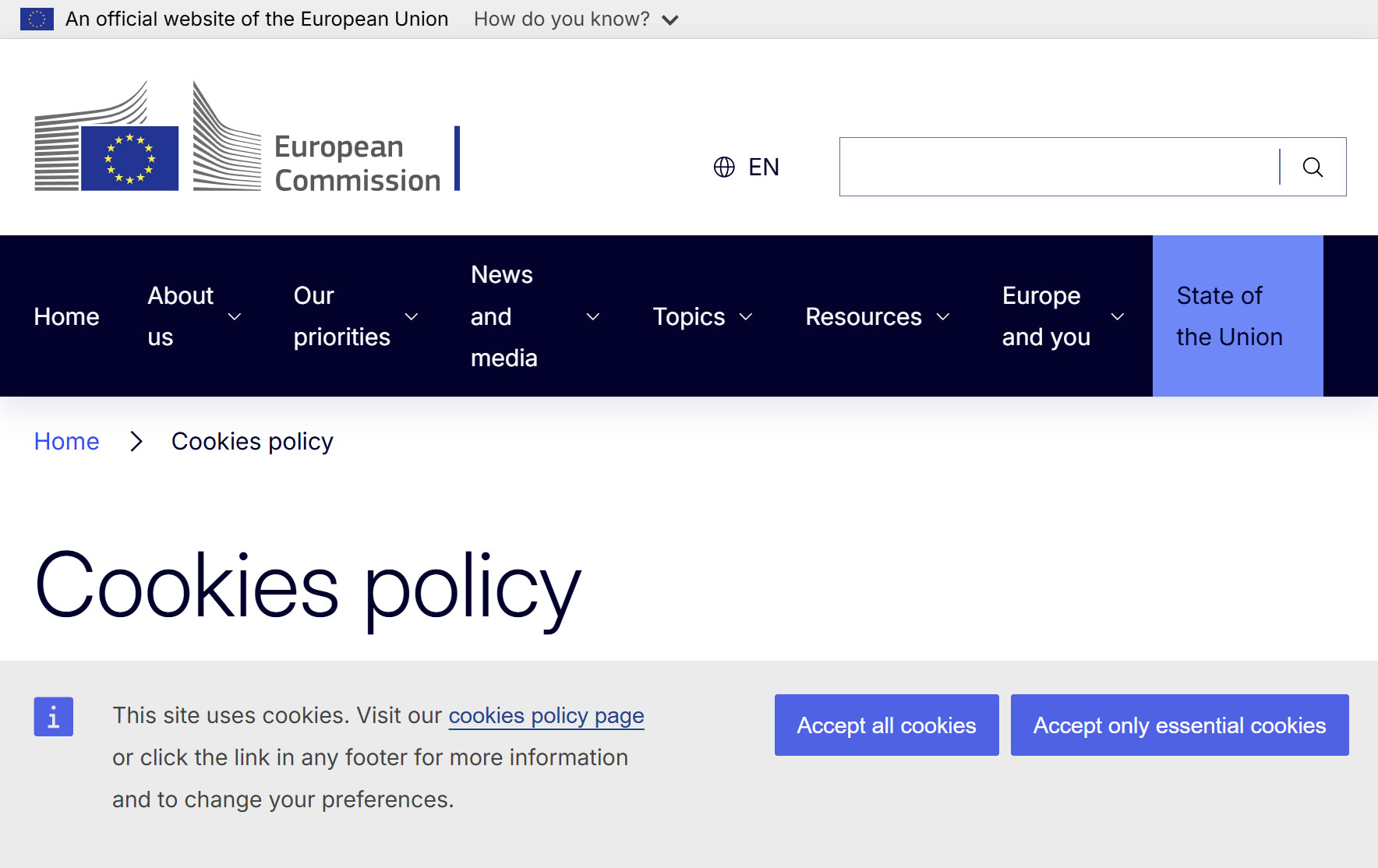The end of EU-imposed cookie consent pop-ups could be nigh — consent fatigue and clickspamageddon to be addressed by European Commission amendments to its 2009 e-Privacy Directive
How many human hours have been wasted dismissing cookie alerts?

The plague of cookie consent alerts, banners, and pop-ups that have added a sliver of sandpaper to web surfing since 2009 might be eradicated in December. The European Commission (EC) intends to revise a law called the e-Privacy Directive, reports Politico. Specifically, new guidelines from the European Data Protection Board (EDPB) aim to eliminate manipulative consent banners and reduce consent fatigue.
Cookies are a necessary part of the World Wide Web, which seasoned surfers will have first become aware of in troubleshooting – fixing issues by clearing cookies and so on. However, after the e-Privacy Directive came into force in the late noughties, cookies soon became a source of persistent irritation. The directive required website holders to get consent from visitors unless the cookies were strictly necessary.
Now, in 2025, and if you refresh your browser or buy a new computer/device, you’ll face days and days of cookie clickspamageddon to return to smooth surfing on your familiar sites. We know there are browser extensions designed to ignore cookies, but they can have their own trade-offs with privacy, and/or compatibility wrinkles.
Politico shares a quote from Peter Craddock, a data lawyer with Keller and Heckman, which highlights the problem with the current state of cookie consent regulations. “Too much consent basically kills consent,” remarked Craddock. “People are used to giving consent for everything, so they might stop reading things in as much detail, and if consent is the default for everything, it’s no longer perceived in the same way by users.”
The momentum behind the eradication of cookie consent spam has built steadily this year:
- In May, Denmark suggested the dropping of consent banners for cookies that collected data for technically necessary functions or simple statistics purposes.
- On September 15, a note was sent to tech industry players about how the EC is considering changing cookie consent rules to allow for more exceptions.
- On September 22, there was a meeting between the EC and tech industry representatives to discuss cookies and consent banners.
- In December, officials want to present a rewritten directive “scrapping burdensome requirements on digital companies,” says Politico.
The EC is keen to stress that any simplification of cookie consent doesn’t represent a lighter approach to data protection. However, things could be less rigid if cookie regulation were moved to the flexible, risk-based approach behind GDPR.
In practice, some of the changes we look forward to could be the hinted extremely clear ‘reject all’ button, which must be as prominent as any ‘accept all’ option, on all sites. Allowing browser-level consent preferences might be the biggest time saver of all, though. We’ll see how browser makers tune and allow for granular control here.
Get Tom's Hardware's best news and in-depth reviews, straight to your inbox.
Follow Tom's Hardware on Google News, or add us as a preferred source, to get our up-to-date news, analysis, and reviews in your feeds. Make sure to click the Follow button!

Mark Tyson is a news editor at Tom's Hardware. He enjoys covering the full breadth of PC tech; from business and semiconductor design to products approaching the edge of reason.
-
das_stig Many websites like TH abused the consent boxes by deliberately using dark design patterns, multiple screens for hundred of different partners and only proving an accept all and not a reject all buttons, while the watchdogs did nothing, so just another pointless political exercise to justify excessive regulation !Reply -
jackt not surprised: same gang that wants to make backdoored encryption(aka chat control).Reply
Now they are partner of internet-giants, for survelliance, like it happened in the US.
Tom, the plague is the tracking of people, not that popup. -
ThereAndBackAgain Reply
Yeah, my favorite is the one where it has a big "accept all" button, and if you want to not accept any of them, you have to click "manage preferences" or something like that and manually uncheck all of them, and then at the bottom there's two options, something like "accept" (or "accept all") and "save my choices," where the "accept" one will presumably go ahead and ignore that you unticked any boxes and is likely to be mistakenly clicked.das_stig said:Many websites like TH abused the consent boxes by deliberately using dark design patterns, multiple screens for hundred of different partners and only proving an accept all and not a reject all buttons, -
thesyndrome Reply
Those drive me insaneThereAndBackAgain said:Yeah, my favorite is the one where it has a big "accept all" button, and if you want to not accept any of them, you have to click "manage preferences" or something like that and manually uncheck all of them, and then at the bottom there's two options, something like "accept" (or "accept all") and "save my choices," where the "accept" one will presumably go ahead and ignore that you unticked any boxes and is likely to be mistakenly clicked. -
KyaraM Like everyone else here said, the issue isn't the consent banner itself. The issue is:Reply
1) Deliberately misleading design, where the "accept all" button is much larger and more prominent than the reject button
2) Only having the choice between tracking cookies and some crappy subscription when all you want to do is read one damn article; tracking or no tracking shouldn't be allowed to be paywalled
3) Being able to accept everything, but not to decline everything, having a tiny little plain text link to open the settings, where you have to click off three pages of cookies manually, and then be care to not accidentally press "accept all" anyways at the bottom because that button is 3 times larger than the one that declines that stuff, on top of the decline button being named unintuitively.
I'm a huge fan of the ability to deny tracking cookie garbage and similar crap, but dear lord is that stuff implemented abyssmally, and more often than not it is that way by design. THAT is the true plague and what needs to be done. Force those crap companies to make it more user friendly, not abolish the system or give companies more room for their crap. Nobody cares about the darn banner as long as you can click everything off with one click, but the above. The above is the problem. -
democog Oh well, the usual crap from the clowns that have pretty much cancelled our internet surfing.. they have attempted in the past the same rhetoric, proposing the same "measures" to make rape, ehhm sorry, gdrp more "user friendly", but ultimately nobody gives a "" about their "opinion" and I feel we are pretty much as doomed as we are used to beReply -
KyaraM Reply
What the heck are you talking about?democog said:Oh well, the usual crap from the clowns that have pretty much cancelled our internet surfing.. they have attempted in the past the same rhetoric, proposing the same "measures" to make rape, ehhm sorry, gdrp more "user friendly", but ultimately nobody gives a "" about their "opinion" and I feel we are pretty much as doomed as we are used to be -
Wsky Did everybody forget that we always had general cookie control in all browsers? Decades ago. Every time you visited a new site, the browser would ask you if you allow the site to save cookies. And it was so annoying, that users wanted "accept all" (or "accept all except third-party") to be the automatic default. So it was, the cookie control functions were forgotten and then came the GDPR which placed the burden of cookie control on site operators which is like letting the fox guard the henhouse.Reply
Second, "reject all" per default is not a solution because many sites will not function properly if they can't use cookies. -
democog Reply
Well I reckon I 've been harsh, but you may realize (if your not European) that the whole cookie consent story has turned internet surfing a living hell for European citizens, to say the least.. I am pretty sure the vast majority does not give a flying #&£& about what cookies are and what they are supposed to do - but also neither browser extensions in order to disable them are a solution..KyaraM said:What the heck are you talking about?
The responsible behaviour is to care for the public and offer them a civilised everyday use of technology and not to ask them to click thru AND continuously (like, every moth on the same site) every possible cookie consent popup out there, or even install extensions or whatever.. What happens to Europe is unbelievable and beyond any sensible reason, I believe is in fact a abomination, likely coming from those reality void, big pricey pocket Brussels officials..
